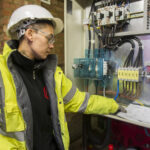A cracked driveway might seem like a minor issue, but don’t be fooled, those small fractures could lead to much bigger problems if left untreated. Not only do they affect the aesthetic appeal of your home, but they can also create serious safety hazards and lead to costly repairs down the road. Fortunately, addressing driveway cracks early on can save you time, money, and hassle. Let’s dive into why cracks form, how you can fix them, and what you need to know to ensure your driveway stays smooth and sturdy for years to come.
The Common Causes of Driveway Cracks
Before we talk about how to fix a cracked driveway, it’s important to understand why cracks form in the first place. While driveways are built to withstand the weight of vehicles and the test of time, several factors can cause them to deteriorate over time. The most common culprits are:
- Weather: Extreme temperatures, whether freezing winters or scorching summers, put a lot of pressure on concrete and asphalt driveways. Water from rain or snow seeps into small cracks, and as it freezes, it expands, causing the cracks to widen. On the flip side, heat causes the materials to expand, and repeated cycles of expansion and contraction can weaken the structure.
- Wear and Tear: Over time, the constant weight of cars, trucks, and even the occasional delivery vehicle can cause the surface of your driveway to crack. This is particularly true if you park heavy vehicles in the same spot day after day.
- Poor Installation: Sometimes, driveways crack because they weren’t installed properly in the first place. If the base wasn’t leveled correctly or the materials weren’t mixed properly, cracks may appear sooner than expected.
Understanding these causes is the first step toward identifying and preventing future cracks. The good news is that most cracks can be fixed quickly and easily if caught early.
Assessing the Damage: How Bad Are the Cracks?
Now that you know why cracks happen, it’s time to take a closer look at your driveway to assess the extent of the damage. Not all cracks are created equal, and some may be more serious than others.
Hairline cracks are generally the easiest to deal with. These small, thin lines don’t usually cause major issues and can often be patched up with a sealant.
Medium cracks might be a bit wider and could signal underlying issues, such as shifting or settling. While they’re still fixable, it’s important to address them sooner rather than later to avoid further damage.
Large cracks are another story. If your driveway has cracks that are an inch or more wide, it might indicate more significant problems with the foundation. In these cases, you may need to consider professional repair services to properly address the issue.
If you’re unsure about the severity of the cracks or what repairs are necessary, it’s always a good idea to get a professional evaluation. A simple “paving near me” search can help you find local contractors who can assist you.
Quick and Easy Fixes for Small Cracks
For smaller cracks, DIY repairs are often an easy and cost-effective solution. Here’s how to get started:
- Clean the Area: Before you begin, use a wire brush, broom, or pressure washer to remove dirt, debris, and loose material from the cracks. This ensures that the repair materials will bond properly to the surface.
- Fill the Cracks: Depending on the type of driveway, you’ll need a different kind of filler. For asphalt driveways, crack filler or sealant works well, while for concrete driveways, a concrete patching compound may be required. Simply apply the filler to the cracks using a putty knife or caulk gun, smoothing it out so that it’s flush with the surrounding surface.
- Seal the Surface: Once the filler has dried, apply a driveway sealer to the entire surface. This helps prevent further damage from water, UV rays, and general wear and tear. It also improves the overall appearance of your driveway.
When to Call in the Pros
If your cracks are too large to handle on your own, it’s time to bring in the professionals. While DIY fixes work well for small, superficial cracks, larger, more complex issues often require expert attention. Here are a few signs that it’s time to reach out for help:
- If cracks are deep and wide, or you’re noticing significant damage, it may indicate a structural problem with your driveway.
- If the driveway has multiple cracks or the surface is uneven, it may be beyond a simple patch job.
- If you’re unsure how to proceed, it’s always better to be safe than sorry. A paving contractor will know how to properly address the issue and restore your driveway to its original state.
While professional repairs may cost more upfront, they often save money in the long run by preventing future damage and extending the life of your driveway.
The Importance of Regular Maintenance
Fixing a cracked driveway is an important part of maintaining your property, but it’s equally important to perform regular maintenance to avoid future issues. Here are a few tips for keeping your driveway in top condition:
- Seal Your Driveway Regularly: Asphalt driveways should be sealed every 2-3 years, while concrete driveways may only need sealing every 3-5 years. Sealing helps protect your driveway from water infiltration, oil stains, and sun damage.
- Keep It Clean: Regular cleaning can prevent debris from building up and causing damage. Sweep off leaves, dirt, and trash, and periodically hose down the driveway to remove stains and grime.
- Repair Minor Cracks Promptly: Addressing small cracks as soon as they appear will prevent them from spreading and causing bigger issues down the road.
When to Consider Replacing Your Driveway
Sometimes, despite your best efforts, a driveway simply can’t be repaired. If you’ve patched it up multiple times and the cracks keep reappearing, it may be time to consider a full replacement. A new driveway will not only improve your home’s curb appeal but will also increase its value.
If you’re on the fence about whether or not to replace your driveway, it’s worth consulting with a professional. They can assess the extent of the damage and help you make the best decision for your home and budget.
Don’t Wait for It to Get Worse
While driveway cracks might seem like a small issue, ignoring them can lead to bigger, more expensive problems. By addressing cracks early on, performing regular maintenance, and knowing when to call in the professionals, you can keep your driveway looking great and functioning properly for years to come.
If you’re dealing with cracks or other damage to your driveway, it’s important to act fast. For a more thorough inspection or repairs, start by searching for “paving near me” to find the best local professionals who can help restore your driveway to its former glory.
By taking proactive steps, you’ll ensure that your driveway remains an asset to your home, one that adds both functionality and curb appeal!







